Born in Michigan in 1937, Jim Harrison spent much of his life in the Upper Peninsula, a region that shaped his voice and became the backdrop for many of his most well-known works. He was a novelist, poet, and essayist whose work dug into the physical and emotional landscapes of the American Midwest. His characters are often men caught between themselves and the world—struggling with the realities of aging, desire, loss, and the land itself. But Harrison also wrote unforgettable women, like the title character in Dalva, and always infused his work with fierce intelligence and a wry sense of humor.
With a love for nature that borders on the spiritual, Harrison’s writing is immersive and deeply personal. This list has a little bit of everything—essays, novels, novellas, memoir, and poetry. These works are perfect for readers that enjoy rich storytelling, complex characters, and exploring the deeper connections between life, nature, and personal growth.
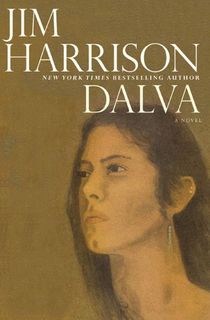
Dalva
Dalva is a sweeping, personal epic that blends the intimate with the historical. At the center is Dalva herself: 45 years old, fiercely intelligent, dryly funny, capable, and quietly yearning.
After living in California for years, Dalva returns to her family’s ancestral home in Nebraska. But this is more than a homecoming—it's a reckoning. Decades earlier, at just 15, she fell deeply in love with a magnetic and troubled half-Sioux man. Their love resulted in a child, a son she was forced to give up for adoption. Now, years later, Dalva is searching—not just for her son, but for a deeper understanding of who she is and where she comes from.
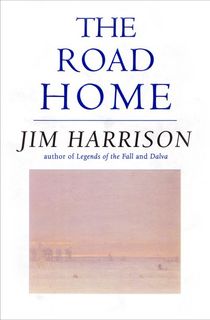
The Road Home
Told through five distinct narrators, this multigenerational saga gives voice to the Northridge family. At its center, of course, is Dalva Northridge, but we also meet the characters who shaped her, whose voices fill in the spaces around her own.
We meet John Wesley Northridge II, a passionate, womanizing intellectual whose journals and memories frame the family's broader legacy. His narrative is followed by that of his son Paul, then Naomi, Dalva’s complex, quietly strong mother. She’s followed by Dalva’s son, Nelse, a naturalist and ornithologist who inherited more than just his mother’s independent spirit.
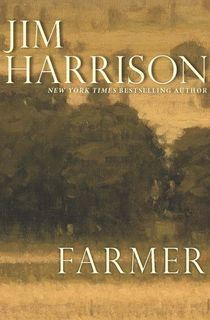
Farmer
A 43-year-old high school history teacher and part-time farmer confronts a midlife crisis. Joseph lives a modest, predictable life, shaped by small-town rhythms, the seasons, and his connection to the land.
Joseph’s days are spent teaching, tending to his land, drinking, and reflecting on the choices he didn’t make—not pursuing meaningful relationships or following his passions fully. When he becomes involved with a much younger woman, it forces him to confront his stagnation.
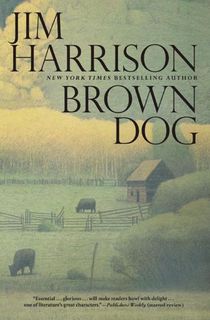
Brown Dog
A series of novellas spanning over two decades, Brown Dog centers on one of Harrison’s most beloved characters: a man called Brown Dog, or B.D. Orphaned as a young boy and raised by his grandfather, he struggles to find any firm footing as he makes his way through the world.
Brown Dog drifts through life in Michigan’s Upper Peninsula, working odd jobs, sleeping in deer shacks, drinking too much, chasing women, dodging responsibility, and occasionally stumbling into trouble that’s part misadventure, part existential comedy. He seems to have no glory or meaning, but ends up embodying a rugged, authentic spirituality rooted in the natural world and raw life experience.
Across six novellas—including Brown Dog, The Seven-Ounce Man, and Westward Ho—we watch B.D. navigate romance, search for a child he believes might be his, and clash with the law.
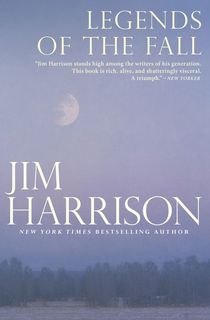
Legends of the Fall
Legends of the Fall is a collection of three novellas—Revenge, The Man Who Gave Up His Name, and the titular Legends of the Fall. Each story examines the intense emotions and complex moral choices of men caught in the grip of love, loss, and the relentless pull of fate.
The title novella, Legends of the Fall, is the best known (especially after the 1994 film adaptation with Brad Pitt). It tells the saga of the Ludlow family set against the backdrop of early 20th-century Montana and the turmoil of World War I.
Revenge follows Cochran, a former Navy pilot who falls in love with the wife of a powerful Mexican crime boss.
The Man Who Gave Up His Name follows a successful businessman who walks away from his affluent life in search of something simpler.
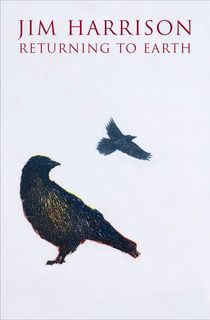
Returning to Earth
Donald is 45, a Chippewa-Finnish man living in Michigan’s Upper Peninsula and dying of ALS. As his body slowly gives out, he turns to what he can still offer: his voice. He begins to share the story of his life with his wife and their two children, hoping to leave them something lasting.
To Donald, it’s ultimately more than a history—it’s a gift, a way to hold onto identity and belonging before he’s gone.
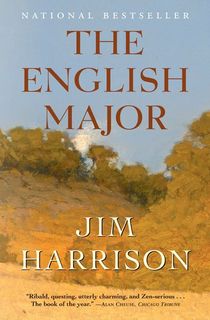
The English Major
Cliff is 60, a former teacher and failed cherry farmer whose life has come apart at the seams. Recently divorced, he lost his farm, and even his dog, to his ex-wife. Feeling aimless, he sets off across the country with nothing but a beat-up map and a mission: to rename all the states and birds to align with the indigenous tribes that used to live across the country.
What follows is part road trip, part existential ramble. Cliff isn’t exactly angry—just kind of stunned at how fast his life unraveled. There’s warmth in his confusion, an uneasy humor in his attempts to make sense of things. He’s not looking to be saved; he’s just hoping to understand the mess and maybe find a bit of joy in it again.
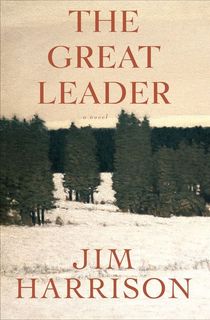
The Great Leader
Simon Sunderson is a detective near the end of his career in the Michigan State Police. If he had it his way, he would coast quietly into retirement. But peace rarely comes that easily.
Sunderson finds himself pulled into a disturbing case involving a charismatic cult leader known as “The Great Leader”—a man who manipulates young girls under the pretense of offering spiritual enlightenment. The pursuit takes Sunderson from the woods of Michigan to the plains of Nebraska, but it’s more than a manhunt. As he follows the trail, he’s also forced to look inward—at the compromises he’s made, the mistakes he can’t take back, and the loneliness that’s settled into his bones after a lifetime in law enforcement.
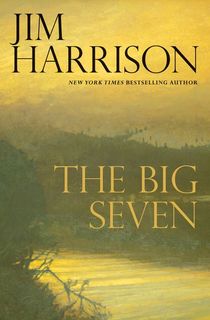
The Big Seven
In this sequel to The Great Leader, Sunderson does his best to return to the quieter parts of life in Michigan’s Upper Peninsula after his retirement from the police force. But instead of peace, he finds chaos. After a failed attempt to rescue his adopted daughter, he winds up pulled into the lives of the family next door, a deeply troubled clan tangled in abuse, violence, and eventually, murder. Sunderson, equal parts lost and nosy, can’t help but get involved.
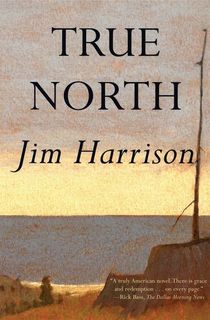
True North
True North gives us David Burkett—a man born into wealth and legacy, but haunted by what that legacy cost the land and people of Michigan’s Upper Peninsula. His ancestors made their fortune by clear-cutting forests and mining the earth, and now a guilt-ridden David sets out to reckon with the damage they left behind. He walks the land, digs into history, and tries to write a kind of reckoning—a record of the wrongs committed in the name of progress.
At the same time, he struggles to escape the shadow of his father, a cruel, predatory man who embodies everything David wants to reject.
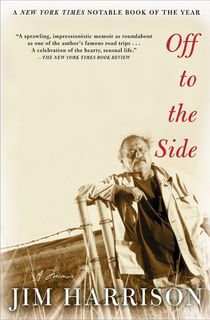
Off to the Side
In Harrison’s memoir, he reflects on his life, his writing career, and the forces that have shaped him as both a person and a writer. Unlike the typical, chronological memoir, it’s a collection of musings, anecdotes, and reflections on the experiences and relationships that have been most meaningful to him, particularly in his time as a writer and a man deeply connected to the land.
Harrison had a profound reverence for the physical world in his writing. He meditates on the landscapes of Michigan, Montana, and the places that have been central to his life.

A Really Big Lunch
A Really Big Lunch is a collection of essays, musings, and personal reflections that showcase Harrison’s passion for the pleasures of eating, drinking, and living. Harrison brings the reader to the table with him, making the average meal a sensory experience rich with meaning, memory, and indulgence.
The title essay is a reflection on a large, extravagant lunch Harrison shared with friends in the Italian countryside. It becomes more than an essay about food; it’s a meditation on friendship, joy, and the art of savoring life.
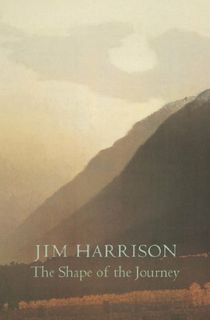
The Shape of the Journey: New & Collected Poems
Though he’s typically better known for his novels and essays, Harrison had a deep love of poetry. He captures the raw beauty of nature, the intricacies of the human experience, and the quiet moments that often define our lives. This collection showcases both his older poems and newer works, offering a full arc of his poetic evolution.

